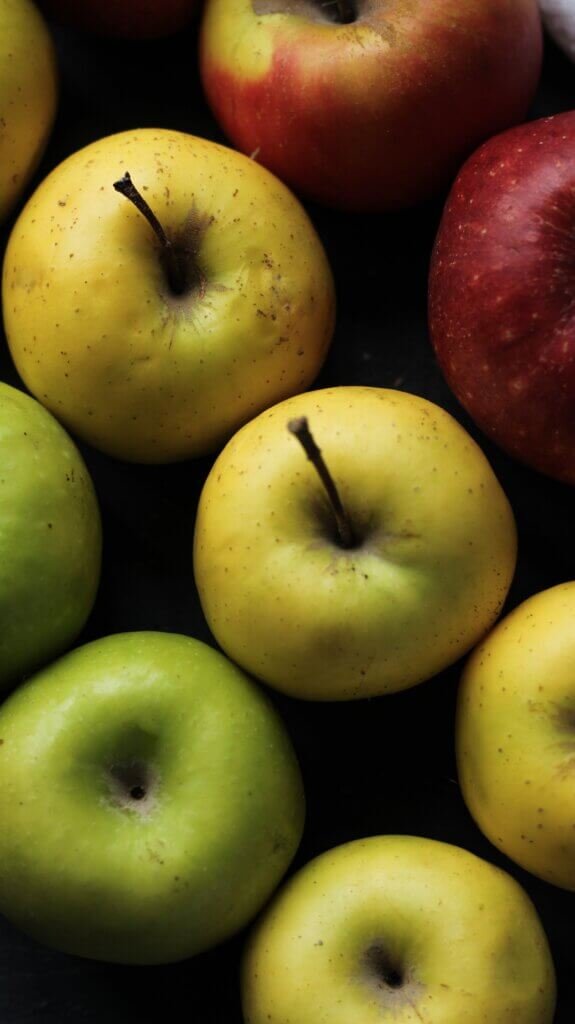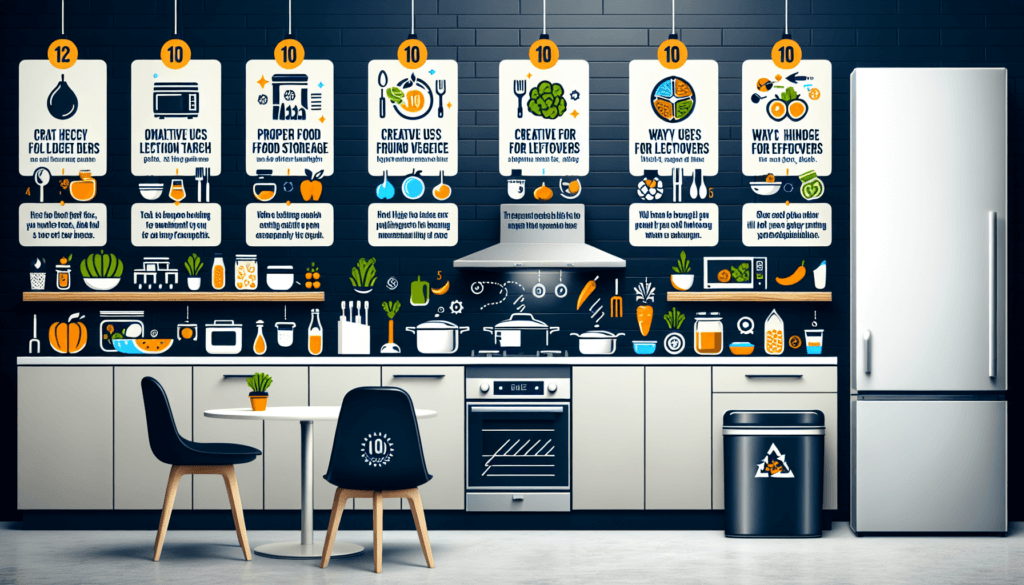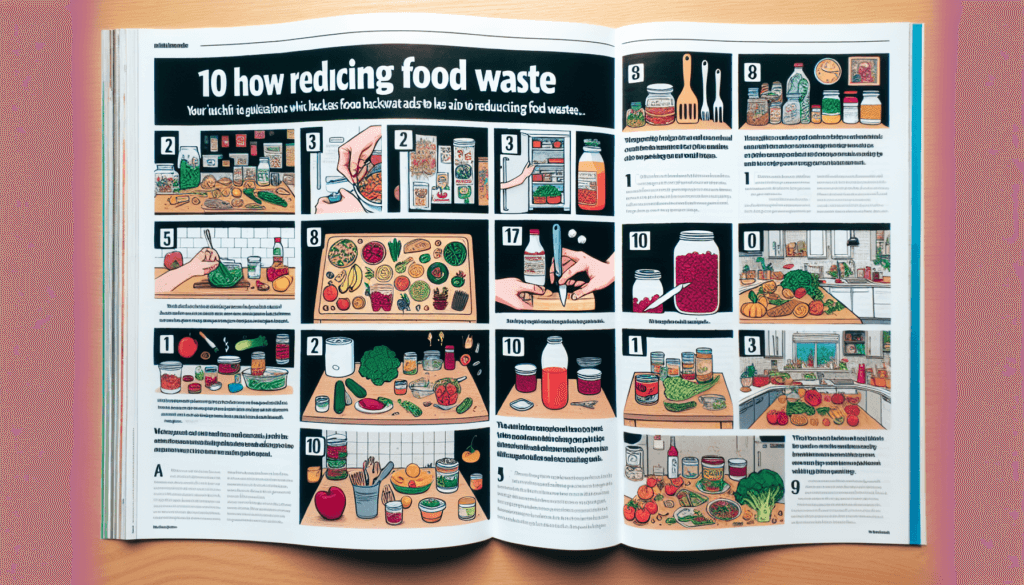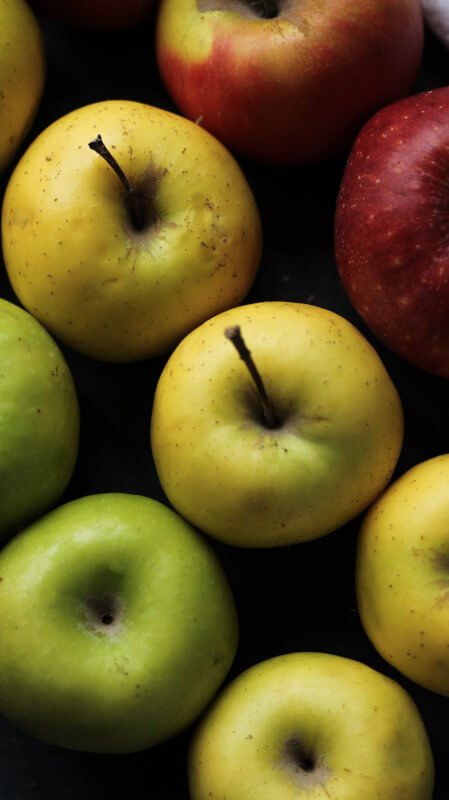Imagine being able to make a small change in your daily kitchen routine that not only saves you money, but also helps to reduce food waste. Well, look no further! In this article, you will discover ten simple kitchen hacks that can make a big difference in minimizing food wastage. From clever storage techniques to creative recipe ideas, these tips will empower you to make the most of your ingredients and take a step towards a more sustainable lifestyle. Ready to become a kitchen waste warrior? Let’s get started!
1. Meal Planning
Create a weekly meal plan
Meal planning is a crucial step in reducing food waste. By taking the time to plan your meals for the week, you can ensure that you only buy the ingredients you need and avoid buying excess food that may go to waste. Take a look at your schedule and think about what meals you would like to have for the week. Consider any leftovers you have from previous meals and incorporate them into your plan. Write down your meal plan and hang it on your fridge or keep it on your phone for easy reference throughout the week.
Shop for ingredients accordingly
Once you have your meal plan in place, it’s time to make a shopping list. Go through each meal and write down all the ingredients you will need. Be specific and check your pantry and fridge to avoid buying duplicates. Stick to your list when you go grocery shopping to avoid impulse buys and unnecessary purchases. Shopping with a plan not only reduces food waste but also saves you time and money.
Use leftovers for future meals
Leftovers often end up forgotten in the depths of the refrigerator, only to be discovered once they have gone bad. By using your leftovers creatively, you can minimize food waste and save yourself some cooking time. Consider incorporating leftover proteins, vegetables, and grains into salads, stir-fries, or sandwiches. Get creative in the kitchen and transform your leftovers into delicious new meals. Not only will you reduce waste, but you’ll also add variety to your meals.
2. Proper Storage
Store fruits and vegetables appropriately
Properly storing fruits and vegetables is essential for maintaining their freshness and preventing spoilage. Some fruits, like apples and bananas, release ethylene gas, which can cause other fruits and vegetables to ripen more quickly. Keep ethylene-producing fruits separate from other produce or store them in a paper bag to reduce the gas’s exposure to the rest of your fruits and vegetables. Additionally, storing fruits and vegetables in the refrigerator can help prolong their freshness.
Label and organize perishable items
Keeping your refrigerator organized is key to ensuring that perishable items don’t get lost or forgotten and end up going bad. Labeling leftovers with the date they were cooked can help you keep track of when they need to be eaten. Make use of clear containers or use a marker to write the date directly on the container. Organize your fridge by placing older items towards the front, making them more easily accessible and reminding you to use them before they spoil.
Utilize airtight containers and wraps
Investing in airtight containers and wraps can significantly extend the life of your food. Airtight containers help keep moisture and air out, preventing food from spoiling quickly. They are especially useful for storing leftovers or partially used ingredients. Be sure to choose containers that are the appropriate size for your food, as empty space can lead to faster spoilage. Additionally, using beeswax wraps or reusable silicone bags can help preserve fruits, vegetables, cheese, and bread by preventing them from drying out or becoming stale.
Freeze excess food before it spoils
Freezing food is a great way to prevent spoilage and extend its shelf life. When you find yourself with excess food that you’re unable to use before it goes bad, take the opportunity to freeze it for future use. Cut fruits and vegetables into smaller pieces and place them in airtight freezer-safe bags or containers. Label them with the contents and date, making it easy to find and use them later. Freezing bread, meats, and even cooked meals can help you reduce food waste and have convenient options available when you’re short on time.

3. Preserve and Ferment
Learn to can and preserve produce
Canning and preserving fruits and vegetables is a great way to extend their shelf life and reduce food waste. With a few basic tools and some patience, you can learn to can and preserve your own produce. Make jams, jellies, and spreads from fresh fruits, or pickle vegetables to enjoy them throughout the year. Canning allows you to capture the flavors of the season and enjoy your favorite fruits and vegetables long after their peak.
Make homemade jams and pickles
Homemade jams and pickles are not only delicious but also a fantastic way to use up surplus fruits and vegetables. When you have an abundance of ripe fruits, consider making jams or jellies to enjoy on toast or as a topping for yogurt. Similarly, pickling vegetables like cucumbers or carrots can help preserve them and add a tangy crunch to your meals. Experiment with different flavor combinations and get creative in the kitchen.
Experiment with lacto-fermentation
Lacto-fermentation is a method that utilizes natural fermentation processes to preserve food and enhance flavor. By introducing beneficial bacteria, lacto-fermentation creates a unique tangy taste and improves the nutritional value of the food. Traditionally, this method has been used to make foods like sauerkraut, kimchi, and pickles. Try your hand at lacto-fermentation and discover the wonders of homemade fermented foods while reducing food waste.
Extend shelf life through dehydration
Dehydrating food is an effective way to preserve it and extend its shelf life. You can use a dehydrator or even your oven to remove the moisture from fruits, vegetables, and herbs. Dehydrated foods take up less space, making them easier to store, and can be rehydrated when you’re ready to use them. Sun-drying herbs or making fruit leather from overripe fruits are great ways to reduce food waste and have homemade pantry staples at your fingertips.
4. Revive and Transform
Revitalize wilted or sad-looking produce
It’s common to come across wilted or sad-looking produce in your kitchen. Instead of throwing them away, try reviving them and giving them a second chance. For wilted greens or herbs, submerge them in a bowl of ice-cold water for a few minutes to help crisp them up. If your vegetables are looking a bit sad, consider roasting them to bring out their natural sweetness and revive their texture. By giving your produce a little love, you can turn them into delicious meals and reduce food waste.
Repurpose stale bread or leftovers
Stale bread doesn’t have to go to waste. Instead of tossing it, you can repurpose it into delicious dishes. Use stale bread to make breadcrumbs for coating meats or adding texture to casseroles and stuffing. Alternatively, turn stale bread into croutons or toast it to make delicious homemade croutons for salads. Leftovers can also be transformed into new meals by incorporating them into stir-fries, wraps, or omelets. Get creative and give your leftovers a delicious makeover.
Turn overripe fruit into smoothies or desserts
When your fruit becomes overripe and too soft to enjoy on its own, it’s the perfect opportunity to turn it into smoothies or desserts. Simply blend your overripe fruits with yogurt or milk to create a refreshing smoothie. You can also freeze the fruit and blend it with some milk or coconut water to make a delicious and healthy sorbet. Don’t let your overripe fruits go to waste – there are plenty of ways to enjoy them in sweet treats.

5. Love Your Freezer
Utilize your freezer for long-term storage
One of the most valuable assets in your kitchen for reducing food waste is your freezer. Make sure to utilize it to its fullest potential. Not only can you freeze excess fruits and vegetables, but you can also store meats, bread, and even prepared meals. Having a well-stocked freezer allows you to minimize waste and have options readily available when you’re short on time or ingredients.
Prep and freeze meals in advance
Meal prepping and freezing meals in advance can save you a significant amount of time and help prevent food waste. Dedicate a day or two each week to preparing and portioning meals that can be frozen for later use. Cook larger batches of soups, casseroles, or stews and portion them out into individual containers. This will give you quick and convenient meals that require minimal effort to prepare, while also reducing the risk of food waste.
Freeze excess herbs in oil or water
Fresh herbs can add incredible flavor to dishes, but they tend to spoil quickly. To prevent them from going to waste, freeze any excess herbs you have. Chop the herbs and place them in ice cube trays with a little bit of water or oil. Once frozen, transfer the herb cubes to a freezer bag and use them whenever you need to add some freshness to your cooking. It’s an easy and convenient way to make sure you always have herbs on hand.
Create ice cube trays with leftover liquids
Don’t let leftover liquids go to waste! Whether it’s stock, juice, or even wine, freeze them in ice cube trays for future use. These frozen cubes can be added to soups, stews, or sauces, adding an extra depth of flavor without any waste. It’s a clever way to repurpose excess liquids and ensure that you get the most out of every ingredient.
6. Make Use of Stems, Seeds, and Skins
Reuse herb stems in soups or stocks
When using fresh herbs, don’t throw away the stems! Herb stems may not be as flavorful as the leaves, but they still contain some essence. Save your herb stems and use them to infuse soups, stocks, or sauces. Tie the stems together with kitchen twine and add them to your pot, allowing them to infuse their subtle flavors. It’s a simple way to minimize waste and make the most of your herbs.
Save vegetable scrapings for homemade broth
When preparing vegetables, don’t discard the scraps and peelings. Save them to make homemade vegetable broth. Collect onion skins, carrot tops, celery leaves, and any other vegetable scraps in a freezer bag. Once you have enough, simmer the scraps in water to create a flavorful and versatile vegetable broth. Not only will you reduce waste, but you’ll also have a homemade broth ready for soups, stews, and sauces.
Roast seeds from fruits and vegetables
Seeds from fruits and vegetables, such as pumpkin, squash, or peppers, can be roasted and enjoyed as a tasty snack. Simply rinse the seeds to remove any pulp, spread them on a baking sheet, and roast them in the oven until they’re golden brown. Add some salt or your favorite seasonings, and you have a nutritious and delicious snack, while also making use of every part of the produce.
DIY fruit zest and flavored salts
Before throwing away the peels of citrus fruits, consider using them to make fruit zest. Citrus zest is a fantastic way to add bright, intense flavors to your cooking and baking. Use a microplane or grater to remove the zest, making sure to avoid the bitter white pith. Store the zest in an airtight container in the freezer until you’re ready to use it. Additionally, you can infuse salt with citrus zest or herbs to create flavorful salts to enhance your dishes.

7. Repackage and Portion
Divide bulk purchases into smaller portions
Buying in bulk can be cost-effective, but it can also lead to waste if you can’t use everything before it spoils. To avoid this, divide your bulk purchases into smaller portions that are more manageable for your household. Use airtight containers or resealable bags to package the portions and label them with the contents and date. This way, you can take out only what you need and keep the rest fresh for longer.
Repackage snacks and ingredients for freshness
Snacks, like chips or crackers, often come in large bags, making it easy to overindulge and allow them to go stale. To keep snacks fresh, divide them into smaller portions in airtight containers or resealable bags. This not only reduces the risk of them becoming stale but also helps with portion control. The same principle applies to ingredients like flour, sugar, or rice. Repackage them in airtight containers to keep them fresh and prevent pantry pests.
Separate and freeze meat in individual servings
If you buy meat in larger quantities, it’s a good idea to portion it out and freeze it in individual servings. This way, you won’t have to thaw and cook more meat than you need, reducing the risk of it going to waste. Wrap each portion tightly in plastic wrap or place them in resealable bags, making sure to remove as much air as possible. Label the packages with the type of meat and the date, and they’ll be ready to use whenever you need them.
8. Embrace Composting
Start a composting system in your kitchen
Composting is an eco-friendly way to reduce food waste and create nutrient-rich soil for your garden or plants. Set up a compost bin or use a composting service if available in your area. Keep a compost container in your kitchen to collect food scraps like fruit and vegetable peels, coffee grounds, and eggshells. Empty the container into your compost bin regularly, ensuring a balance between green (nitrogen-rich) and brown (carbon-rich) materials. Composting is a great way to give back to the earth while minimizing waste.
Compost fruit and vegetable scraps
The majority of food waste in our kitchens comes from fruit and vegetable scraps. Instead of tossing these scraps in the trash, compost them. Fruit and vegetable peels, cores, and other scraps contain valuable nutrients that can be returned to the soil through composting. Remember to chop larger pieces into smaller bits to speed up the decomposition process. By composting fruit and vegetable scraps, you close the loop and contribute to a more sustainable food system.
Use coffee grounds and tea leaves as compost
After brewing your coffee or tea, don’t throw away the grounds or leaves. Coffee grounds and tea leaves are valuable additions to your compost bin. They add nitrogen and moisture to the mix, helping to break down other organic materials more efficiently. Sprinkle coffee grounds and tea leaves directly onto your compost pile or mix them into the soil around your plants. Not only will you minimize waste, but you’ll also be providing your plants with a nutrient-rich boost.

9. Shop Smart
Make a shopping list and stick to it
One of the simplest and most effective ways to reduce food waste is by making a shopping list and sticking to it. Before heading to the grocery store, take a few minutes to plan your meals for the week and make a list of the ingredients you need. Having a list keeps you focused on what you truly need and prevents you from buying items on impulse. Stick to your list and avoid purchasing excess items that may end up going to waste.
Avoid impulse buys and excess
When at the grocery store, it’s easy to be tempted by flashy promotions or eye-catching displays. However, impulse buys often lead to wasted food, as we tend to buy things we don’t actually need. Stay focused on your shopping list and avoid unnecessary purchases. Ask yourself if the item is something you will realistically use or if it’s just adding to clutter and potential waste.
Check expiry dates while shopping
Reducing food waste starts right at the grocery store. Before adding items to your cart, take a moment to check their expiry dates. Choose products with the longest shelf life to ensure that you have enough time to use them before they spoil. Avoid products near or past their expiry date, as they may go bad before you have a chance to use them. Being mindful of expiry dates while shopping helps contribute to a waste-free kitchen.
Support local farmers and reduce food miles
Consider supporting local farmers and purchasing locally grown produce. Locally sourced food often has a shorter travel distance, reducing greenhouse gas emissions associated with long-distance transportation. By supporting local farmers, you can have fresher produce while also reducing food waste. Locally grown produce is typically harvested closer to its peak freshness and has a longer shelf life, minimizing the risk of it going bad before you can enjoy it.
10. DIY and Repurposing
Create homemade broth from kitchen scraps
Rather than buying store-bought broth, consider making your own at home using kitchen scraps. Save vegetable scraps, such as onion peels, carrot tops, and celery leaves, in the freezer until you have enough. Simmer these scraps in water along with some herbs and seasonings to create a flavorful homemade broth. Not only does this reduce food waste, but it also allows you to control the ingredients and customize the flavors to your liking.
Repurpose stale bread into breadcrumbs or croutons
If you have stale bread on hand, don’t throw it away. Instead, repurpose it into breadcrumbs or croutons. Simply toast the bread until crisp, and then either pulse it in a food processor for homemade breadcrumbs or cut it into small squares for croutons. Both breadcrumbs and croutons can be used in various dishes to add texture and flavor. By repurposing stale bread, you can transform it into something delicious and avoid wasting perfectly good food.
Use vegetable peels for vegetable broth
When peeling vegetables, don’t discard the peels. Instead, use them to make another batch of homemade vegetable broth. Store peels from onions, carrots, potatoes, and other vegetables in the freezer until you have enough to make a flavorful vegetable stock. Simmer the peels with water and herbs, strain the liquid, and use it as a base for soups, stews, and sauces. This simple step can help reduce waste and enhance the flavors of your dishes.
Craft homemade cleaners from citrus peels
Citrus peels can be repurposed to make homemade cleaners that are effective and environmentally friendly. Save the peels from oranges, lemons, or grapefruits and place them in a jar with white vinegar. Let the peels infuse in the vinegar for a couple of weeks. Strain the liquid and dilute it with water to clean surfaces, floors, and even windows. This natural cleaner not only helps reduce waste but also eliminates the need for store-bought cleaning products.



